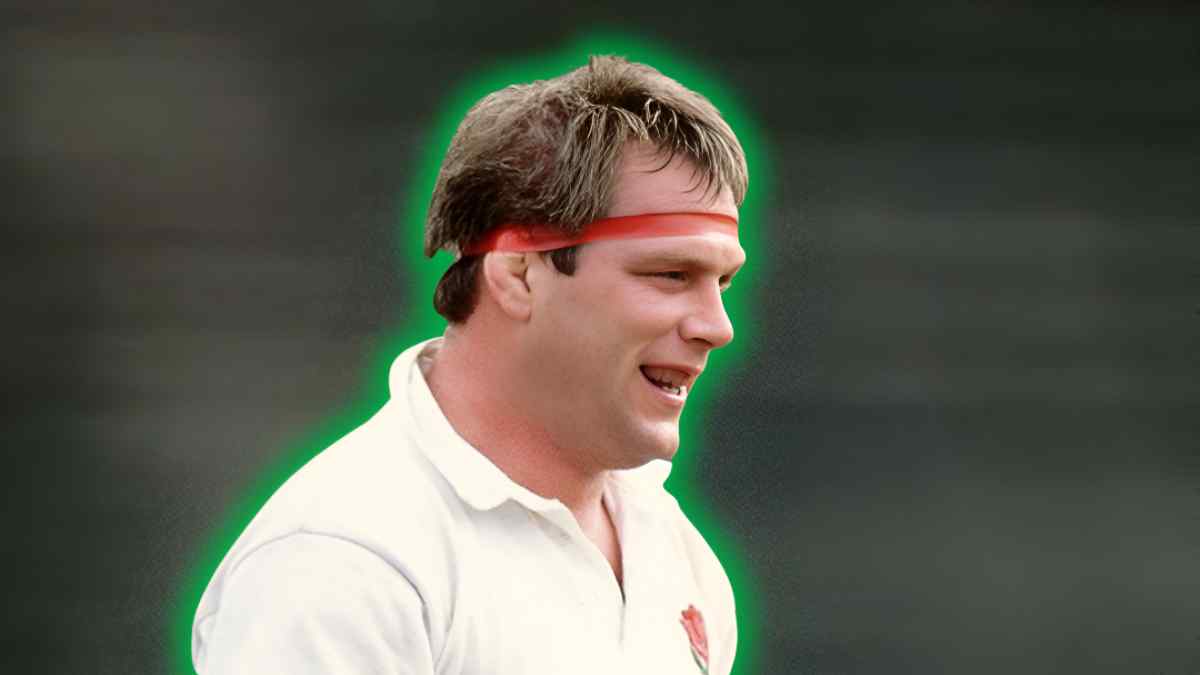
Jeff Probyn’s name holds a special place in the history of English rugby union. Renowned for his sheer determination and distinctive scrummaging technique, he carved out a remarkable career that continues to inspire players and coaches alike. Born in the heart of London, Probyn’s journey from local club matches to representing England on the international stage is a story of perseverance, skill, and unrelenting passion for the sport. His career and post-playing contributions have left a lasting imprint not only on the pitch but also within the broader rugby community.
Table of Contents
ToggleEarly Life and Rugby Beginnings
Jeff Probyn was born on 27 April 1956 in Bethnal Green, a working-class area of London. Growing up in a city renowned for its sporting culture, he discovered rugby as a young boy and quickly developed a love for the physical and tactical aspects of the game. Unlike many modern professionals who are identified and nurtured at academy level, Probyn followed a more traditional and often more challenging path. He balanced his early sporting ambitions with a day job and the responsibilities of ordinary life, which gave him a grounded perspective that would serve him well in his later career.
His introduction to rugby came through local clubs where grit and camaraderie mattered as much as technical skills. The young Probyn quickly revealed a natural aptitude for the tighthead prop position. He possessed broad hips and an ability to stay unusually low in the scrum, a physical trait that would become his trademark. Even before the professional era, rugby demanded a unique combination of physical resilience and mental fortitude, and Probyn demonstrated both in abundance.
Club Career and Rise to Prominence
Probyn’s club career included spells at Old Albanian and Streatham before he established himself as a formidable force at Wasps. At a time when English club rugby was fiercely competitive and dominated by tough, uncompromising forwards, his strength in the set piece made him a prized asset. He helped Wasps secure the English league title in 1990, a significant achievement that underscored both his personal excellence and the collective power of the squad.
Playing club rugby during the amateur era required not only skill but also remarkable commitment. Travel, training and matches were juggled with work commitments, and players relied on sheer passion rather than the promise of professional contracts. Probyn thrived in this environment, using every opportunity to refine his scrummaging technique. His low, powerful body position gave him a mechanical advantage over taller opponents, and his sharp tactical mind ensured he out-thought as well as out-muscled rival front rows.
England Debut and International Success
In 1988, at the relatively mature age of thirty-one, Jeff Probyn earned his first England cap against France. In an era when players were often thought to have peaked earlier, his late arrival on the international stage was a testament to his perseverance and unwavering dedication. Far from being a fleeting presence, he became a cornerstone of the national side’s front row.
Between 1988 and 1993, Probyn earned thirty-seven caps for England and crossed the try line three times. His international career coincided with a period of significant growth and success for English rugby. He was a key figure in the England squad that reached the final of the 1991 Rugby World Cup, a campaign that captured the imagination of rugby supporters across the nation. Although England narrowly lost to Australia in the final, Probyn’s dominance in the scrum and his relentless work rate earned widespread respect from teammates and opponents alike.
His performances in the Five Nations Championship (now the Six Nations) were equally noteworthy. Season after season, he provided England with a platform of stability, anchoring the scrum and allowing the backs to unleash their attacking flair. His opponents often spoke of the difficulty in gaining leverage against his unique scrummaging style. Probyn’s ability to stay low and drive through the heart of the opposing pack made him a nightmare for rival props and a reliable foundation for his own team.
Technique and Playing Style
Probyn’s scrummaging technique was the subject of much discussion and even controversy. He possessed sloping shoulders and a naturally low stance, allowing him to stay beneath his opposite number and exert upward pressure. Some opponents speculated that he used the sleeves of his shirt to gain additional purchase in the scrum, prompting a few to cut off their own sleeves in an effort to neutralise any perceived advantage. Whether or not these claims held truth, his reputation as a scrummaging technician was beyond dispute.
His strength was matched by an intelligent understanding of the game. He read the ebb and flow of the scrum with a tactical awareness that made him more than just a brute force. He knew when to exert pressure, when to hold back, and how to manipulate the engagement to England’s benefit. In a position where technical mastery is often overlooked by casual spectators, Probyn turned the dark arts of front-row play into a spectacle of controlled aggression and strategic brilliance.
Tours and Representative Honours
In addition to his England career, Probyn was selected for other representative sides that recognised his standing among the world’s elite. In 1989, he toured South Africa as part of a World XV, showcasing his talents against some of the toughest opposition of the time. He also appeared in matches for British and Irish Lions selections, further cementing his reputation as one of the finest props of his generation.
These tours allowed Probyn to test his skills against international opponents outside the familiar battlegrounds of the Five Nations. His performances on these occasions demonstrated that his scrummaging prowess was not limited to northern hemisphere conditions. Whether facing the power of South African packs or the technical precision of southern hemisphere teams, Probyn consistently held his own.
Leadership and Influence
Beyond his physical contributions, Jeff Probyn was a natural leader. He commanded respect in the dressing room and offered a wealth of experience to younger players. His path to the international arena—marked by patience and perseverance—made him an inspiring figure for teammates who might have doubted their own chances of late success. His calm presence under pressure and his willingness to mentor emerging talent helped foster a strong team culture within the England squad.
He was also known for his forthright personality. Whether on the pitch or in interviews, he spoke his mind with clarity and conviction. This directness, combined with a deep understanding of the game, ensured that his opinions were valued both during his playing days and long after his retirement.
Transition to Coaching and Administration
After hanging up his boots in 1993, Probyn moved naturally into coaching and rugby administration. He managed the England Under-21 side from 1994 to 1997, playing a pivotal role in shaping the next generation of English talent. During this period he introduced figures such as Clive Woodward and Andy Robinson to representative rugby coaching, individuals who would later guide England to World Cup glory in 2003.
His influence extended into the governance of the sport as he became a member of Club England and served on the Rugby Football Union’s committee. He was also part of the 2006 review that oversaw changes in the England coaching setup after the nation’s World Cup triumph. Through these roles, Probyn continued to shape English rugby policy and development, ensuring that his expertise and passion for the game benefited future generations.
Media Work and Public Speaking
Jeff Probyn’s insights into the intricacies of rugby have made him a popular pundit and media personality. He is a regular voice on talkSPORT, where his straight-talking style and deep technical knowledge appeal to seasoned rugby followers and casual listeners alike. In addition, he contributes columns to The Rugby Paper, offering analysis and commentary on the evolving landscape of the sport.
Beyond the media, he has established himself as a respected public and motivational speaker. Drawing on the lessons of discipline, teamwork and resilience that defined his playing career, he inspires audiences far beyond the confines of rugby. His ability to translate sporting experience into broader life lessons makes him a sought-after figure at corporate events and educational gatherings.
Charitable Work and Legacy
Probyn’s commitment to the rugby community extends to charitable endeavours. He is the Honorary President of Wooden Spoon, a charity that uses rugby’s values to support disadvantaged children and young people across the UK and Ireland. This role reflects his belief in the power of sport to bring positive change to society and underscores the generous spirit that has characterised his life both on and off the field.
His legacy is not merely a collection of statistics and accolades; it is a testament to resilience and the enduring values of rugby union. He proved that success is not confined to early bloomers, showing that persistence and a relentless work ethic can overcome age and perceived limitations. For aspiring players, his story remains a beacon of inspiration.
Conclusion
Jeff Probyn stands as one of England’s most respected rugby props, a player whose scrummaging mastery and competitive fire helped define an era of English rugby. From his modest beginnings in Bethnal Green to his influential roles in coaching, administration and charity work, he has consistently exemplified the qualities of perseverance, intelligence and leadership. His career reminds us that true greatness lies not only in athletic talent but also in character and the ability to lift others. For the rugby world and for anyone who values dedication and resilience, Jeff Probyn’s story continues to resonate as a powerful example of how commitment and passion can leave a lasting mark on sport and society.



